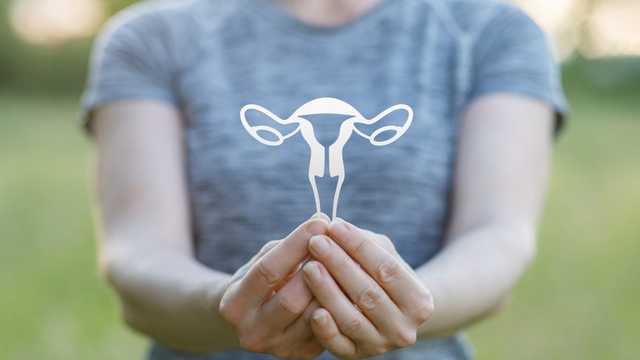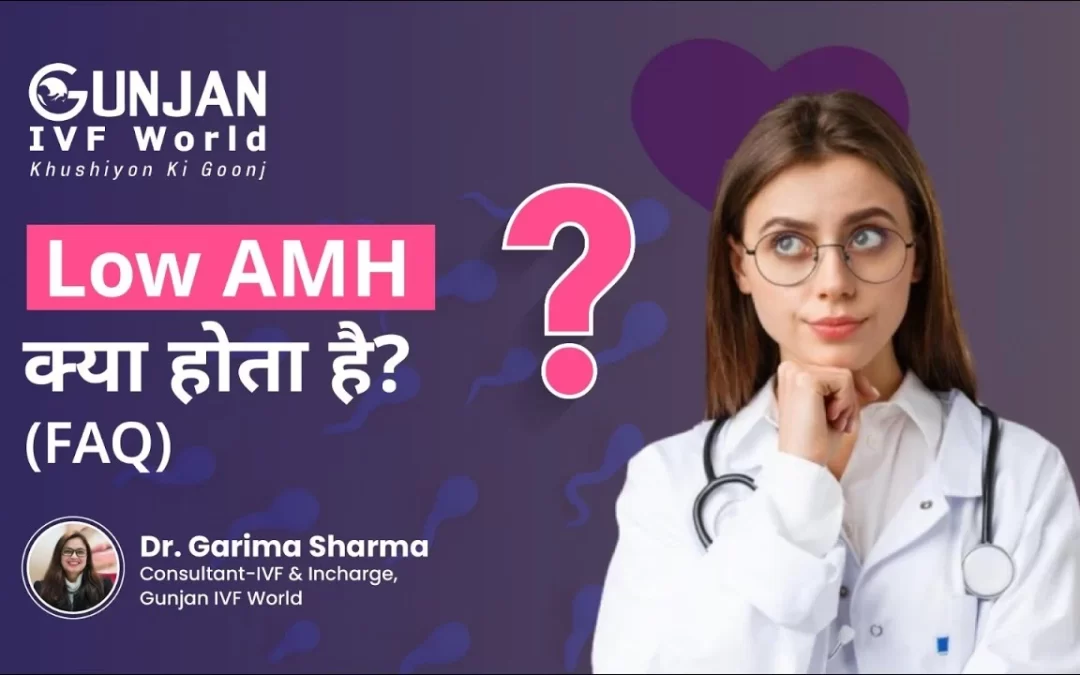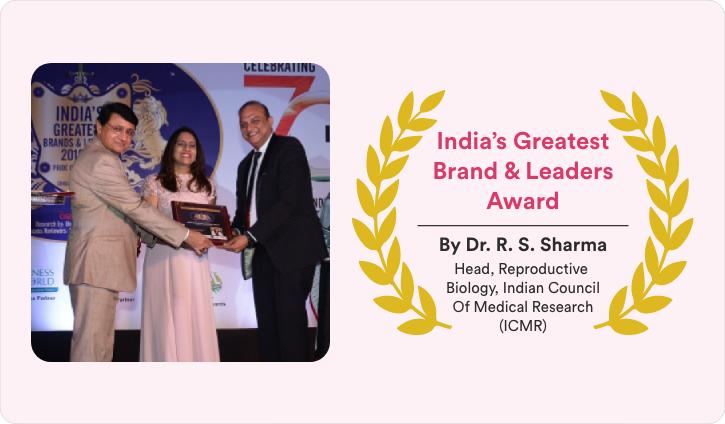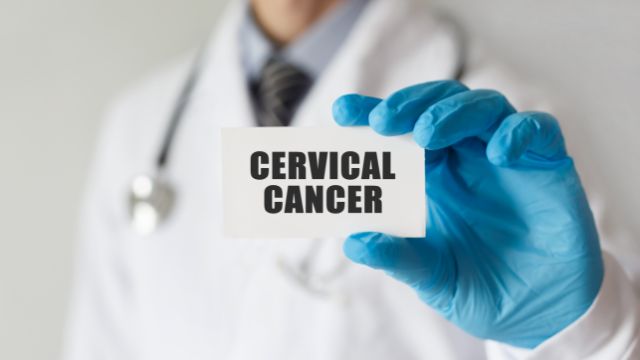Uterine Cancer

Overview
If you have been recently diagnosed with uterine cancer, or are a caregiver for someone who has, you may be feeling overwhelmed.
Uterine cancer also called endometrial cancer, is the most common type of gynecologic cancer. Uterine cancer affects the uterus. It is a relatively rare form of cancer, accounting for only about 2 per cent of all cases of cancer each year. While uterine cancer is not as common as other types of cancer, it can be serious and requires treatment. It can be deadly if not caught early.
With all the information available online today, it can be hard to know where to start. This guide provides an overview of what you need to know about uterine cancer so that you can feel confident making decisions about your care. We’ll cover everything from
Everything You Need to Know About Uterine Cancer
What is It | Causes | Symptoms | Diagnose | Treatment Option | Side Effects | Risks and Complications | Survival Rate | Prognosis | Gunjan IVF Clinic’s Unique Approach
By arming yourself with information, you can take an active role in your care and improve your chances for a successful outcome. So let’s get started!
What is uterine cancer & its types?
Uterine cancer also called endometrial cancer, is a type of cancer that begins in the uterus. The uterus is the pear-shaped organ in a woman’s pelvis where a baby grows during pregnancy. Uterine cancer is the most common type of gynecologic cancer. Gynecologic cancers are cancers that start in a woman’s reproductive organs.
Endometrial cancer usually starts in the lining of the uterus, which is called the endometrium.
There are two main types of endometrial cancer.
Type 1: This type accounts for about 80 per cent of uterine cancers. It tends to grow slowly and is often found at an early stage. Type 1 tumours are usually treated with surgery.
Type 2: This type grows more quickly and is more likely to spread to other parts of the body. Type 2 tumours are often found at a later stage. Treatment may include surgery, radiation therapy, and/or chemotherapy.
Sub Treatments For Cancer Screening
What causes uterine cancer?
The cause of uterine cancer is not fully understood, but there are some risk factors that can increase your chance of developing the disease. These include
- Age: Uterine cancer is most common in women over age 50. The risk increases as you get older.
- Obesity: Women who are obese have an increased risk of uterine cancer. Obesity can also make it harder to treat the disease.
- Diabetes: Women with diabetes have a higher risk of uterine cancer.
- Tamoxifen: This drug is used to treat breast cancer. Women who take tamoxifen have an increased risk of uterine cancer.
- Family history: Women with a family history of uterine cancer or ovarian cancer are at increased risk.
- Other health conditions: Women with certain other health conditions, such as polycystic ovary syndrome (PCOS) or endometriosis, are at increased risk.
It’s important to remember that having one or more of these risk factors does not mean that you will develop uterine cancer. Many women with one or more risk factors may never develop the disease.
What are the symptoms of uterine cancer?
The most common symptom of uterine cancer is abnormal bleeding. This can include
- Bleeding that occurs between periods
- Bleeding after menopause
- Bleeding that is heavier or lasts longer than usual
- Spotting or discharge from the vagina
Other symptoms of uterine cancer may include
- Pelvic pain or pressure
- Pain during sex
- Abnormal vaginal discharge
- Frequent urination
If you experience any of these symptoms, it’s important to see your doctor so that the cause can be determined. These symptoms can also be caused by conditions other than cancer, such as infection or benign (non-cancerous) tumors. Only a doctor can make a diagnosis.
How is uterine cancer diagnosed?
If you have symptoms that suggest you may have uterine cancer, your doctor will likely order one or more tests. These may include
- A pelvic exam: During this exam, your doctor will check for any abnormal changes in your reproductive organs
- A Pap test: This test is used to look for changes in the cells of the cervix, which is the lower part of the uterus that opens into the vagina. A sample of cervical cells is collected and sent to a laboratory for analysis
- An endometrial biopsy: In this procedure, a small sample of tissue is taken from the lining of the uterus and sent to a laboratory for analysis. This can be done in a doctor’s office
- Imaging tests: These may include an ultrasound, MRI, or CT scan. These tests are used to create images of the inside of your body
- A hysteroscopy: In this procedure, a thin, lighted tube is inserted through the vagina and cervix into the uterus. This allows the doctor to see inside the uterus and take tissue samples if needed
- A laparoscopy: In this procedure, a small incision is made in the abdomen and a thin, lighted tube is inserted into the abdomen. This allows the doctor to see inside the abdomen and take tissue samples if needed
Once all of the test results are available, your doctor will stage the cancer. Staging is a way of describing how far the cancer has spread in your body. It’s important to know the stage of the disease because it helps guide treatment decisions.
The most common staging system for uterine cancer is the FIGO (International Federation of Gynecology and Obstetrics) system, which uses Roman numerals ranging from I to IV
- Stage I: The cancer is confined to the uterus
- Stage II: The cancer has spread beyond the uterus but is still within the pelvis
- Stage III: The cancer has spread outside of the pelvis to nearby lymph nodes or tissues
- Stage IV: The cancer has spread to distant parts of the body, such as the lungs or liver
Your doctor may also use other staging systems, such as the TNM (tumor, node, metastasis) system.
What are the treatment options for uterine cancer?
The treatment of uterine cancer will depend on a number of factors, including the stage of the disease, your overall health, and your preferences. Treatment options for uterine cancer include
Cancer Surgery:
Surgery is the most common treatment for uterine cancer. The type of surgery will depend on the stage of the disease. For early-stage cancers, a hysterectomy (surgery to remove the uterus) may be all that is needed. For more advanced cancers, a hysterectomy may be combined with the removal of nearby lymph nodes and other tissues. In some cases, a radical hysterectomy (surgery to remove the uterus, cervix, ovaries, fallopian tubes, and nearby lymph nodes) may be needed
Radiation therapy :
This treatment uses high-energy beams to kill cancer cells. It can be used before or after surgery
Chemotherapy :
This treatment uses drugs to kill cancer cells. It can be given intravenously (through an IV) or orally (in pill form). Chemotherapy is usually given in cycles, with each period of treatment followed by a rest period to allow you to recover
Hormone therapy:
This treatment uses drugs to stop the production of hormones or to block hormone receptors. Hormone therapy is sometimes used to treat uterine cancer that has spread beyond the uterus. You and your doctor will work together to choose the treatment plan that’s best for you.
What are the side effects of uterine cancer treatments?
The side effects of uterine cancer treatments vary depending on the type and extent of treatment. Surgery, radiation therapy, and chemotherapy can all cause side effects.
Common side effects of surgery include pain, bleeding, infection, and changes in urinary and bowel function. Radiation therapy can cause fatigue, skin irritation, and vaginal dryness. Chemotherapy can cause nausea, vomiting, hair loss, and low blood cell counts.
Hormone therapy side effects vary depending on the type of drug used. Common side effects of hormone therapy drugs include hot flashes, night sweats, vaginal dryness, and weight gain.
It’s important to discuss the potential side effects of all treatments with your doctor before starting any treatment.
What are the risks and complications of uterine cancer?
Uterine cancer is a serious disease that can be life-threatening if not treated promptly. Complications of uterine cancer can include
- Spread of the cancer to other parts of the body
- Recurrence of the cancer after treatment
- Difficulty urinating
- Difficulty having a bowel movement
- Pelvic pain
- Abnormal vaginal bleeding
You can lower your risk of developing uterine cancer by maintaining a healthy weight, exercising regularly, and avoiding the use of certain hormones. If you have any concerns about your risk of uterine cancer, be sure to discuss them with your doctor.
Survival rate in uterine cancer
The 5-year survival rate for women with uterine cancer is about 80%. This means that 80% of women diagnosed with the disease are still alive 5 years after diagnosis. The 10-year survival rate is about 63%. Survival rates are lower for women with more advanced stages of the disease.
What is the prognosis for uterine cancer?
The prognosis for uterine cancer depends on a number of factors, including the stage of the disease, your overall health, and your preferences. Treatment options for uterine cancer include surgery, radiation therapy, chemotherapy, and hormone therapy. You and your doctor will work together to choose the treatment plan that’s best for you.
Gunjan IVF Clinic’s unique approach to treating Uterine Cancer
At Gunjan IVF Clinic, we believe that each patient is unique and deserves individualized care. We take a comprehensive approach to treating uterine cancer, which includes
- A thorough evaluation by a team of specialists
- Customized treatment plans based on the stage of the disease
- Close monitoring throughout treatment
- Supportive care to help manage side effects
We provide the latest treatments for uterine cancer, including minimally invasive surgery, targeted therapy, and robotic surgery.
If you or someone you love has been diagnosed with uterine cancer, we can help. Call us today to schedule an appointment.
Patient Testimonials
It’s always the word of mouth that’s the best advice
Published On: 3 Dec 2018
London to Gunjan IVF: Mrs. Pragya's journey of parenthood |Treated for pregnancy care | Gunjan IVF
Published On: 7 Oct 2018
We are pregnant!! | Pregnancy after Fibroid Removal Treatment (Myomectomy)| Gunjan IVF World

Erica Benn
It was such a nice experience with Dr. Gunjan and how she tackle our case. I must recommend this clinic as one of the best IVF clinic in Delhi-NCR. Thanks to Dr. Gunjan to give me my motherhood.

Nitesh Kumar Thakur
Gunjan IVF World in Indirapuram, Ghaziabad is the best hospital for surrogacy and ivf services in Delhi-NCR. Dr. Gunjan Gupta is founder and director of Gunjan IVF World. Gunjan IVF is the best ivf center in Indirapuram , Ghaziabad. Treatments at affordable prices.

Akansh Garg
Dr gunjan gupta is one of best gyne in delhi ncr especially in ghaziabad she explains each n everything very clearly to avoid any confusion. staff is very supportive n helpful.

Manisha Pathak
Went for treatment at various places in Delhi since 2012. Then came to know about Gunjan IVF. Started treatment in October 2020. The treatment is going on and we are quite hopeful. Gunjan ma'am is a very good doctor who treated me well and the staff are also very good and helpful.

Erica Benn
It was such a nice experience with Dr. Gunjan and how she tackle our case. I must recommend this clinic as one of the best IVF clinic in Delhi-NCR. Thanks to Dr. Gunjan to give me my motherhood.

Nitesh Kumar Thakur
Gunjan IVF World in Indirapuram, Ghaziabad is the best hospital for surrogacy and ivf services in Delhi-NCR. Dr. Gunjan Gupta is founder and director of Gunjan IVF World. Gunjan IVF is the best ivf center in Indirapuram , Ghaziabad. Treatments at affordable prices.

Akansh Garg
Dr gunjan gupta is one of best gyne in delhi ncr especially in ghaziabad she explains each n everything very clearly to avoid any confusion. staff is very supportive n helpful.

Manisha Pathak
Went for treatment at various places in Delhi since 2012. Then came to know about Gunjan IVF. Started treatment in October 2020. The treatment is going on and we are quite hopeful. Gunjan ma'am is a very good doctor who treated me well and the staff are also very good and helpful.
Patient Guide
Along with treating our patients, we also guide them with the help of our educational blogs and videos.
Educational Blogs

Why do blastocyst not implant?
The reasons for an unsuccessful implantation are very uncommon and rare as well. Blastocyst provides a greater chance of becoming pregnant therefore the procedure is handled properly as well.

What happens after blastocyst transfer?
Before jumping to the immediate question first let’s have a small brief of what is blastocyst transfer. Blastocyst transfer is the transfer of embryos that have achieved a higher stage of development.

Can blastocyst fall out?
Maximum patients worry about what they can do or cannot do after an embryo transfer. They have the fear that if they do something wrong, the embryo would not attach or fall out.
Educational Videos

What is TORCH test in infertility and why is it done?
There are numerous tests that are available to infertile couples that are recommended by some doctors, which might help them determine the cause of their infertility. One such test is the TORCH test.

What is Prolactin Hormone?
Prolactin is a hormone produced by the pituitary gland present at the brain’s base. It is best known for its role in lactation, or milk production, in breastfeeding women.However, Prolactin also plays other important roles in both men and women, such as regulating the immune system, stimulating the growth of new blood vessels, and influencing behaviour and reproductive function. In this blog, we will explore what Prolactin is, how it works, and what happens when there are imbalances in prolactin levels.

Frequently Asked Questions about Low AMH
Primordial and Preantral follicles produce AMH. So the AMH level indicates the number of eggs or egg reserves you have in your ovary. Putting simply, if your AMH level is low, then the number of eggs in your ovary is less.
Frequently Asked Questions
Can obesity or being overweight have an impact on a man’s fertility?
Comprehensive Fertility Treatments | Gynaecology Procedures | Menopause Management | Pregnancy Care | Maternity & Birthing Call +91-9990044555A short article by IVF experts...
Does testicular temperature have an impact on male fertility
IVF specialists of the best IVF centre in Ghaziabad – Gunjan IVF World share an informative blog on one of the most ignored factors of male infertility. It is an alarming fact to...
Is male menopause a myth or reality ?
IVF specialists of the best IVF centre in Ghaziabad – Gunjan IVF World debunk the myths about male menopause through this informative blog Menopause as a term is extremely common...
Media Coverage

Most Trusted and Transparent IVF CenterIn Delhi NCR
Published on 29th Aug
The reasons for unsuccessful implantation are very uncommon and rare as well. Blastocyst provides a greater chance of becoming pregnant therefore the procedure is handled properly as well.

Best IVF Centre In U.P
The reasons for an unsuccessful implantation are very uncommon and rare as well. Blastocyst provides a greater chance of becoming pregnant therefore the procedure…

India Greatest Brand & Leaders Award
The reasons for an unsuccessful implantation are very uncommon and rare as well. Blastocyst provides a greater chance of becoming pregnant therefore the procedure…

Most Trusted and Transparent IVF CenterIn Delhi NCR
Published On: 29th Aug

Best IVF Centre In U.P
Published On: 29th Aug






